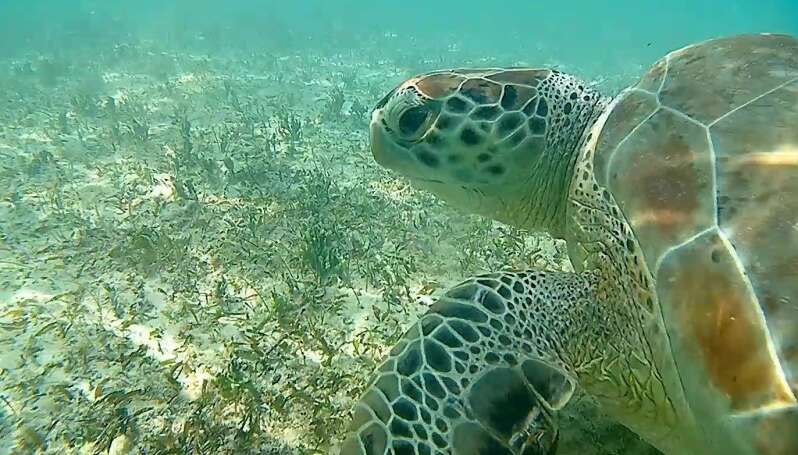Recent News
Photos: Lions Club Gas-O-Rama FundraiserSaturday, February 13, 2021
The Hamilton Lions Club, BZS Junior Volunteers and Rubis Terceira North Shore Gas Station are helping to raise money for Vision Bermuda and the Bermuda Zoological Society, with the 52nd annual Gas-O-Rama taking place today [Feb 13] at the gas station in Devonshire.
‘The Hunt’ Was On For Families Over Holiday
Tuesday, January 12, 2021
Over 80 families registered ‘The Hunt’, and those taking part have been able to experience and learn more about their island they thought they knew so well.
Rubis calendars will now be sold
Tuesday, December 08, 2020
After 42 years of being free, the Rubis calendar will now cost $5 each.
Aquarium junior volunteers get chance to complete programme
Thursday, December 03, 2020
Pupils enrolled in a competitive volunteer programme through the Bermuda Zoological Society have been given a second chance to complete it in the wake of Covid-19.
Bermuda Turtle Project Continues Research
Monday, October 15, 2018
The Bermuda Zoological Society in partnership with the Sea Turtle Conservancy completed another research and education programme this year, with the Bermuda Turtle Project committed to the goal of promoting the conservation of marine turtlesthrough research and education.
About
GovernanceAbout Us
Newsletter
Latest News
Gift & Bookstore
Contact
General Inquiries
info@bzs.bm
Latest News
All the latest updates and news from the Bermuda Aquarium, Museum, and Zoo, one of Bermuda's leading visitor attractions!

Many acres of seagrass beds crucial for the survival of sea turtles and other marine life have “completely collapsed” over the last four years, according to a leading environmental group.
The Bermuda Turtle Project says “immediate changes” are needed to save the remaining seagrass beds and to help new ones to grow.
While praising the conservation and research efforts already being carried out by the Department of Environment and Natural Resources to protect seagrass habitats, Jennifer Gray, director of the Turtle Project, said more needs to be done in an opinion piece which appears on the Opinion section of The Royal Gazette today.
Ms Gray said the Bermuda Turtle Project (BTP) is resuming its in-water research this week after a 24-month absence caused by the Covid-19 pandemic, but added it is already clear from observations “there have been some drastic changes in our marine environment”.
She said: “Once thriving seagrass beds have been in decline for some two decades, but over the last 48 months many acres of this critical habitat have completely collapsed with not a blade of grass left.
“Along with the disappearance of seagrass comes numerous consequences comprising disturbance and shifting of the marine sediments that were once held stable by the root systems of the seagrass and a vulnerability to the arrival of potentially invasive species, especially algae.
“Even more troubling is the seeming departure of once-visible species like fish and sea turtles. BTP has been documenting a change in the size class of green turtles on the Bermuda platform that shows green turtles departing our shores at a smaller size than they once did.”
Ms Gray said it is likely that some sea turtles are still living around Bermuda and may have changed habitats.
“We need to get out there and conduct our research to obtain a clearer picture of what is happening,” said Ms Gray.
“We know there are still turtles here, and that they appear to be utilising new habitats around the island. There have been observations of small green turtles feeding on algae and even mangrove leaves, perhaps making a diet change rather than risking a migration. Further studies are essential and will help fill in the blanks on what, exactly, is happening with sea turtles in Bermuda.”
She said research is also needed on other causes of seagrass decline including seagrass pathogens and disease, some of which have wiped out similar habitats on the US coastlines and could have easily arrived in Bermuda.
In the meantime, she said other immediate steps can be taken to arrest the decline in the seagrass and sea turtle and fish populations.
These include protecting sharks and other natural predators in order to return to a more natural balance in the food web and ecosystem and Introducing marine protected areas (MPAs) where harmful fishing practices, anchoring, engine outputs and propeller scarring are eliminated.
“This would afford a better chance for seagrass recovery and the return of juvenile fish which, when they multiply, would spill outside the protected area, providing an increase in abundance in areas where fishing does take place.”


